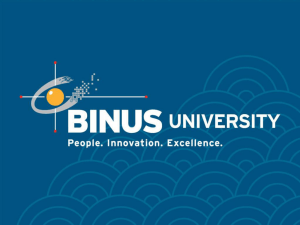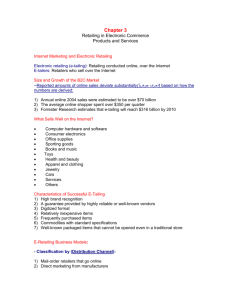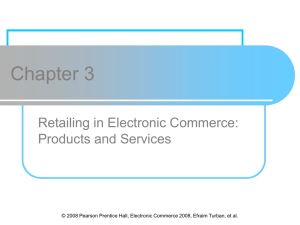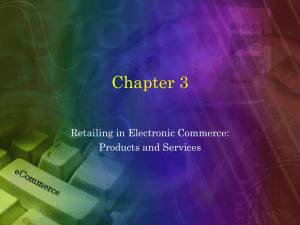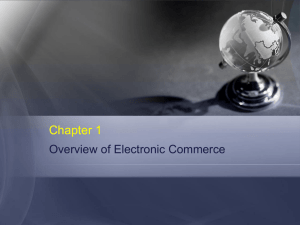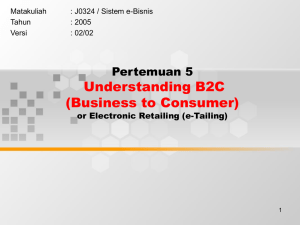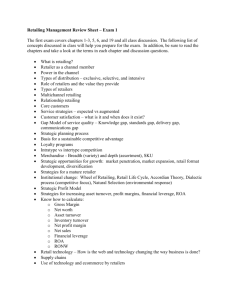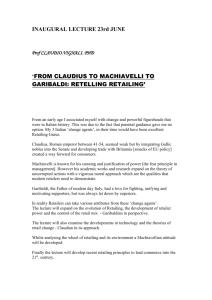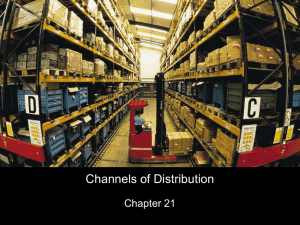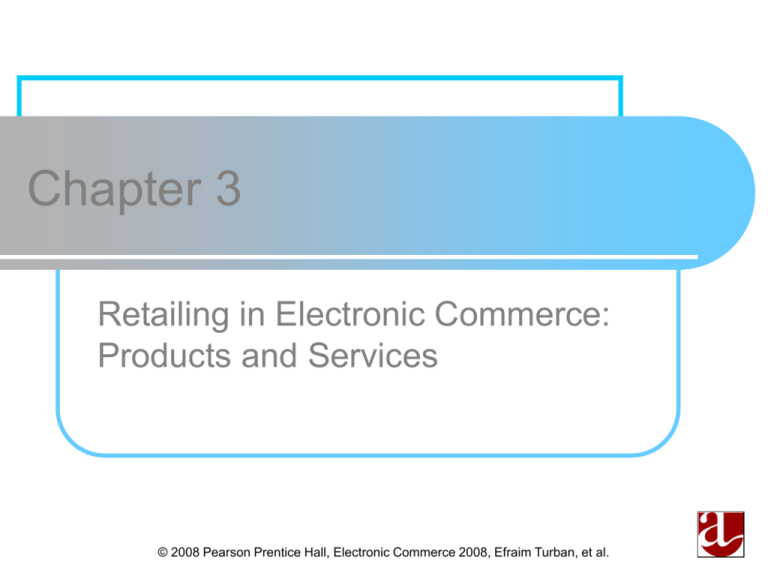
Chapter 3
Retailing in Electronic Commerce:
Products and Services
© 2008 Pearson Prentice Hall, Electronic Commerce 2008, Efraim Turban, et al.
Learning Objectives
1.
2.
3.
4.
5.
6.
Describe electronic retailing (e-tailing) and its
characteristics.
Define and describe the primary e-tailing business
models.
Describe how online travel and tourism services
operate and their impact on the industry.
Discuss the online employment market, including its
participants, benefits, and limitations.
Describe online real estate services.
Discuss online stock-trading services.
3-2
Learning Objectives
7. Discuss cyberbanking and online personal finance.
8. Describe on-demand delivery by e-grocers.
9. Describe the delivery of digital products and online
entertainment.
10. Discuss various e-tail consumer aids, including
comparison-shopping aids.
11. Identify the critical success factors and failure
avoidance tactics for direct online marketing and
e-tailing.
12. Describe reintermediation, channel conflict, and
personalization in e-tailing.
3-3
Internet Marketing
and Electronic Retailing
electronic retailing (e-tailing)
Retailing conducted online, over the
Internet
e-tailers
Retailers who sell over the Internet
3-4
Internet Marketing
and Electronic Retailing
What Sells Well on the Internet?
Travel
Computer Hardware
and Software
Consumer Electronics
Office Supplies
Sport and Fitness
Goods
Books and Music
Toys
Health and Beauty
Entertainment
Apparel and Clothing
Jewelry
Cars
Services
Pet Supplies
3-5
Internet Marketing
and Electronic Retailing
Characteristics of Successful
E-Tailing
High brand recognition
A guarantee provided by highly reliable or wellknown vendors
Digitized format
Relatively inexpensive items
Frequently purchased items
Commodities with standard specifications
Well-known packaged items that cannot be opened
even in a traditional store
3-6
E-Tailing Business Models
3-7
E-Tailing Business Models
Classification by Distribution Channel
Mail-order retailers that go online
Direct marketing from manufacturers
Pure-play e-tailers
Click-and-mortar retailers
Internet (online) malls
3-8
E-Tailing Business Models
direct marketing
Broadly, marketing that takes place without
intermediaries between manufacturers and
buyers; in the context of this book, marketing
done online between any seller and buyer
virtual (pure-play) e-tailers
Firms that sell directly to consumers over the
Internet without maintaining a physical sales
channel
3-9
E-Tailing Business Models
click-and-mortar retailers
Brick-and-mortar retailers that offer a
transactional Web site from which to
conduct business
brick-and-mortar retailers
Retailers who do business in the nonInternet, physical world in traditional
brick-and-mortar stores
3-10
E-Tailing Business Models
multichannel business model
A business model where a company
sells in multiple marketing channels
simultaneously (e.g., both physical and
online stores)
Retailing in Online Malls
Referring directories
Malls with shared services
3-11
E-Tailing Business Models
Other B2C Models and Special
Retailing
Representative special B2C services
Postal services
Services and products for adults
Wedding channels
Gift registries
3-12
Travel and Tourism Services Online
Special Services
Wireless services
Direct marketing
Alliances and consortia
3-13
Travel and Tourism Services Online
Benefits of Online Travel Services
To travelers
Free information accessible at any time from any
place
Substantial discounts are available
To travel services providers
Airlines, hotels, and cruise lines sell otherwiseempty spaces
Direct selling saves the provider’s commission
and its processing
3-14
Travel and Tourism Services Online
Limitations of Online Travel Services
Many people do not use the Internet
The amount of time and the difficulty of
using virtual travel agencies may be
significant, especially for complex trips and
for inexperienced Internet surfers
Complex trips or those that require
stopovers may not be available online
because they require specialized knowledge
and arrangements
3-15
Travel and Tourism Services Online
Corporate Travel
To reduce corporate travel costs, companies can
make arrangements that enable employees to plan
and book their own trips
Impact of EC on the Travel Industry
The Internet may be contributing to a sharp
reduction in the number of travel agents
It has also driven the rise of intermediaries—thirdparty online sellers and portals provide price
comparisons and a range of other value-adding
services for the consumer
3-16
Employment, Placement,
and the Job Market Online
3-17
Employment, Placement,
and the Job Market Online
THE INTERNET JOB MARKET
Job seekers
Employers seeking employees
Job agencies
Government agencies and institutions
A consortium of large employers and
college careers advisors
Global online portals
3-18
Employment, Placement,
and the Job Market Online
3-19
Employment, Placement,
and the Job Market Online
Limitations of the Electronic Job Market
The gap between those with skills and access to
the Internet and those without
Companies find that they are flooded with
applicants when they advertise online, screening is
a time-consuming and costly process
Security and privacy
High turnover costs for employers by accelerating
employees’ movement to better jobs
3-20
Employment, Placement,
and the Job Market Online
Intelligent Agents in the Electronic
Job Market
Intelligent agents for job seekers
Intelligent agents for employers
3-21
Employment, Placement,
and the Job Market Online
3-22
Real Estate, Insurance,
and Stock Trading Online
Real Estate
E-commerce and the Internet are slowly but surely
having an ever increasing impact on the real estate
industry
Real Estate Applications
Advice for consumers on buying or selling
Commercial real estate listings
Links to house listings in all major cities
Maps
Information on current mortgage rates
3-23
Real Estate, Insurance,
and Stock Trading Online
Real Estate Mortgages
Many sites offer loan calculators
Mortgage brokers can pass loan applications
over the Internet and receive bids from lenders
that want to issue mortgages
“Name your own price” model
Aggregation of loan seekers package placed for
bid on the Internet
3-24
Real Estate, Insurance,
and Stock Trading Online
Insurance Online
Standard insurance policies, such as auto,
home, life, or health are offered at a
substantial discount
Third-party aggregators offer free
comparisons of available policies
Several large insurance and riskmanagement companies offer
comprehensive insurance contracts online
3-25
Real Estate, Insurance,
and Stock Trading Online
Online Stock Trading
Investment information
Related financial markets
The risk of having an online stock account
3-26
Real Estate, Insurance,
and Stock Trading Online
3-27
Banking and
Personal Finance Online
electronic (online) banking (ebanking)
Various banking activities conducted
from home or the road using an Internet
connection; also known as cyberbanking,
virtual banking, online banking, and
home banking
3-28
Banking and
Personal Finance Online
3-29
Banking and
Personal Finance Online
International and Multiple-Currency
Banking
Some international retail purchasing can be
done by providing a credit card number,
other transactions may require international
banking support
3-30
Banking and
Personal Finance Online
Online Financial Transaction
Implementation Issues
Securing financial transactions
Access to banks’ intranets by outsiders
Imaging systems
Pricing online versus offline services
Risks
3-31
Banking and
Personal Finance Online
Personal Finance Online
Online Billing and Bill Paying
Automatic transfer of mortgage payments
Automatic transfer of funds to pay monthly utility
bills
Paying bills from online banking accounts.
Merchant-to-customer direct billing
Using an intermediary for bill consolidation
Person-to-person direct payment
Pay bills at bank kiosks
Taxes
3-32
On-Demand Delivery Systems
and E-Grocers
e-grocer
A grocer that takes orders online and
provides deliveries on a daily or other
regular schedule or within a very short
period of time
on-demand delivery service
Express delivery made fairly quickly after
an online order is received
3-33
Online Delivery of Digital Products,
Entertainment, and Media
3-34
Online Delivery of Digital Products,
Entertainment, and Media
Online Entertainment
Examples of online entertainment
Web browsing
Internet gaming
Fantasy sports games
Single and multiplayer games
Adult entertainment
Card games
Social networking sites
Participatory Web sites
Reading
Live events
3-35
Online Delivery of Digital Products,
Entertainment, and Media
Entertainment-related services
Event ticketing
Restaurants
Information retrieval
Retrieval of audio and video entertainment
3-36
Online Delivery of Digital Products,
Entertainment, and Media
Developments in the Delivery of
Digital Products
CD customization sites
The disintermediation of traditional print
media
Digital delivery may replace or enhance
traditional delivery methods for various
types of digital content
3-37
Online Purchase-Decision Aids
shopping portals
Gateways to e-storefronts and e-malls;
may be comprehensive or niche oriented
shopping robots (shopping agents or
shopbots)
Tools that scout the Web on behalf of
consumers who specify search criteria
“Spy” services
Wireless Shopping comparisons
3-38
Online Purchase-Decision Aids
Business Ratings Sites
Trust Verification Sites
Other Shopping Tools
Amazon.com’s A9 Search Engine
Answers.com
3-39
Problems with E-Tailing
and Lessons Learned
The reasons that retailers give for not
going online include:
Their product is not appropriate for Web
sales
Lack of significant opportunity
High cost
Technological immaturity
Online sales conflict with core business
3-40
Problems with E-Tailing
and Lessons Learned
Lessons Learned
Don’t ignore profitability
Manage new risk exposure
Watch the cost of branding
Do not start with insufficient funds
The web site must be effective
Keep it interesting
3-41
Problems with E-Tailing
and Lessons Learned
Successful Click-and-Mortar
Strategies
Speak with one voice
Leverage the multichannels
Empower the customer
3-42
Issues in E-Tailing
disintermediation
The removal of organizations or business
process layers responsible for certain
intermediary steps in a given supply chain
reintermediation
The process whereby intermediaries (either
new ones or those that had been
disintermediated) take on new intermediary
roles
3-43
Issues in E-Tailing
3-44
Issues in E-Tailing
cybermediation (electronic intermediation)
The use of software (intelligent) agents to
facilitate intermediation
hypermediation
Extensive use of both human and electronic
intermediation to provide assistance in all
phases of an e-commerce venture
Unbundling
3-45
Issues in E-Tailing
channel conflict
Situation in which an online marketing
channel upsets the traditional channels
due to real or perceived damage from
competition
3-46
Issues in E-Tailing
Determining the Right Price
Personalization
Fraud and Other Illegal Activities
How to Make Customers Happy
3-47
Managerial Issues
1. What should our strategic position be?
2. Are we financially viable?
3. How should we introduce wireless
shopping?
4. Are there international legal issues
regarding online recruiting?
3-48
Managerial Issues
5. Do we have ethics and privacy
guidelines?
6. How will intermediaries act in
cyberspace?
7. Should we set up alliances?
3-49

